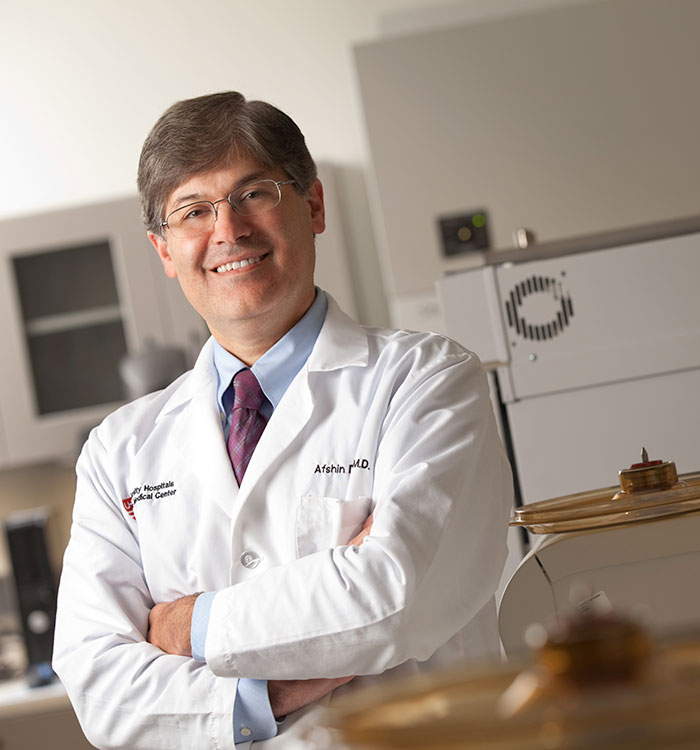Phase 1 Clinical Trials Program at UH Seidman Cancer Center is a Leader in the Field
November 03, 2019
Investigatory Excellence
Innovations in Cancer | Fall 2019
The hallmark of an outstanding Phase 1 clinical trials program is its scientific ingenuity and the breadth of options it provides to cancer patients. But perhaps a less-recognized mark of excellence is a program’s dedication to the operational science of how to conduct Phase 1 trials successfully, understanding who is participating and how best to accommodate their medical needs, while always moving trials forward.
 Afshin Dowlati, MD
Afshin Dowlati, MDAccording to medical oncologist Afshin Dowlati, MD, Lucile and Robert H Gries Endowed Director, Center for Cancer Drug Development, University Hospitals; and Professor of Medicine, Case Western Reserve University School of Medicine, who directs the Phase 1 clinical trials program at UH Seidman Cancer Center, those dual foci characterize the investigatory work under way here.
“Our Phase 1 program is definitely one of the more well-known and larger Phase 1 programs in the country,” he says. “What distinguishes us is the breadth in the number of clinical trials we have. We have between 20 and 30 Phase 1 clinical trials at any given time. It spans a number of malignancies, including all types of solid tumors, all types of hematologic malignancies. It spans drugs with different mechanisms of action, including drugs that are relevant to the hottest topic in oncology – immunotherapy. There are trials of drugs targeting genetic disorders in cancer and a variety of other mechanisms of action. Our Phase 1 program also stands out in the sense that it encompasses almost all specialties. We’re also pretty well-known for doing these very hard-to-do Phase 1 clinical trials. The infrastructure, the know-how, the expertise is really here to do that."
Dr. Dowlati points to several Phase 1 trials of note that are currently under way at UH Seidman Cancer Center. Two important and of-the-moment trials are evaluating the use of anti-CD19 CAR T cells, developed locally in the Cellular Therapy Laboratory jointly managed by UH and the Case Comprehensive Cancer Center at Case Western Reserve University, in treating relapsed or refractory non-Hodgkin’s lymphoma and chronic lymphocytic leukemia and small lymphocytic lymphoma. Another prominent trial is examining the side effects and best dose of methoxyamine when given together with pemetrexed disodium, cisplatin and radiation therapy in treating patients with stage IIIA-IV non-small cell lung cancer.
These trials, among many others, are UH physician-investigator-initiated.
“We have a strong record in physician-investigator-initiated trials, including studies of drugs that were developed and discovered on campus at UH, Case Comprehensive Cancer Center and Case Western Reserve University,” Dr. Dowlati says. “There is drug discovery going on within our program that allows those drugs to be developed in-house."
Yet another trial, also UH physician-initiated, is exploring how to combine radiation therapy from UH’s Proton Therapy Center with immunotherapy.
At the same time, Dr. Dowlati says, industry-sponsored trials are also an important part of the Phase 1 program.
“We have a very strong partnership with a number of large pharmaceutical companies, but also smaller biotech companies, start-up companies that allow them to do clinical trials here,” he says.
One particular area of expertise is in trials for small-cell lung cancer. UH Seidman Cancer Center offers a trial evaluating the safety, tolerability and pharmacokinetics of an experimental agent called AMG 757, being developed by Amgen. A trial of PEN-221, sponsored by Tarveda Therapeutics, is also available. It is being evaluated as a treatment for small cell lung cancer, but also for advanced gastroenteropancreatic, lung, thymus and neuroendocrine tumors, as well as large-cell neuroendocrine carcinoma of the lung. Patients in this trial must have cancer that is somatostatin receptor 2 expressing (SSTR2).
One recent successful partnership with industry, Dr. Dowlati says, was in the Phase 1 trials of larotrectinib as a treatment for cancers with the new cancer gene rearrangement NTRK, sponsored by LOXOPharmaceuticals.
“We were part of the participation, and it was published in The New England Journal of Medicine,” he says. The drug is called larotrectinib. Based on that study, the drug received accelerated approval by the FDA.
”For as much as UH Seidman investigators focus on the details of individual trials such as these, they also conduct more “big-picture” research into how Phase 1 clinical trials can be more successful. Dr. Dowlati and his colleagues have published studies on how participants in Phase 1 clinical trials have changed over time, both in terms of tumor type and the number of prior therapies received before enrolling in the trial. They’ve also completed the largest existing review of octogenarians in Phase 1 trials – a topic that has increased relevance with an aging population. And they’ve studied how adverse events and symptom burden affect participants’ decisions to withdraw from Phase 1 trials.
“We were also the first group a number of years ago to describe the logistics and safety on how to do biopsies on tumors during a Phase 1 clinical trial,” Dr. Dowlati adds. “We were the first group to describe how Phase 1 participation by ethnic minorities and different tumor types has been changing over time. This is important because we need to know which patients need Phase 1 clinical trials.
”Dr. Dowlati says it’s all about making Phase 1 trials as successful as possible.“We want to provide our patients access to novel drugs that have not yet reached the mainstream oncology practice, drugs that are in development,” he says. “That’s always the goal.”
To contact Dr. Dowlati or learn more about the Phase I Clinical Trials Program, call 216-553-1240.


